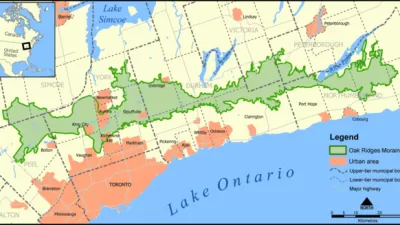A series of hasty removals of land from the protected Greenbelt last year were pushed through without environmental or financial analysis.

A report from Ontario’s Auditor-General reveals that the provincial government removed 3,000 hectares (7,400 acres) from Toronto’s protected Greenbelt to favor certain developers and without appropriate environmental or financial analysis.
As Jeff Gray explains in The Globe and Mail, “The report by Auditor-General Bonnie Lysyk also estimates, based on 2016 data from the Municipal Property Assessment Corp. (MPAC), that the landowners of the 15 formerly protected sites opened up for housing last year could see their worth balloon by more than $8.3-billion.”
The Greenbelt is a 800,000-hectare area surrounding the city created in 2005 to limit sprawl and protect local farmland. Last year, Premier Doug Ford’s government redrew its boundaries in an effort, according to Ford, to create 50,000 new units of much-needed housing.
According to the report, “All but one of the properties removed from the Greenbelt, in what the Auditor-General calls a ‘seriously flawed’ process that took just three weeks, were identified for a small group of civil servants assigned to work on the project by Ryan Amato, the chief of staff to Mr. Clark.” The article continues, “The extremely tight timeline and confidentiality provisions, the audit says, meant bureaucrats could not fully analyze the environmental impact or provide alternatives to the Greenbelt removals.”
FULL STORY: Ford’s Greenbelt removals ‘favoured’ certain developers, Ontario’s Auditor-General says

Maui's Vacation Rental Debate Turns Ugly
Verbal attacks, misinformation campaigns and fistfights plague a high-stakes debate to convert thousands of vacation rentals into long-term housing.

Planetizen Federal Action Tracker
A weekly monitor of how Trump’s orders and actions are impacting planners and planning in America.

San Francisco Suspends Traffic Calming Amidst Record Deaths
Citing “a challenging fiscal landscape,” the city will cease the program on the heels of 42 traffic deaths, including 24 pedestrians.

Defunct Pittsburgh Power Plant to Become Residential Tower
A decommissioned steam heat plant will be redeveloped into almost 100 affordable housing units.

Trump Prompts Restructuring of Transportation Research Board in “Unprecedented Overreach”
The TRB has eliminated more than half of its committees including those focused on climate, equity, and cities.

Amtrak Rolls Out New Orleans to Alabama “Mardi Gras” Train
The new service will operate morning and evening departures between Mobile and New Orleans.
Urban Design for Planners 1: Software Tools
This six-course series explores essential urban design concepts using open source software and equips planners with the tools they need to participate fully in the urban design process.
Planning for Universal Design
Learn the tools for implementing Universal Design in planning regulations.
Heyer Gruel & Associates PA
JM Goldson LLC
Custer County Colorado
City of Camden Redevelopment Agency
City of Astoria
Transportation Research & Education Center (TREC) at Portland State University
Jefferson Parish Government
Camden Redevelopment Agency
City of Claremont





























